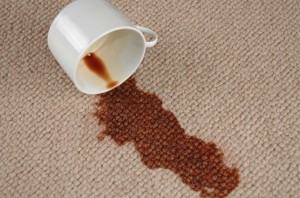First Aid for Your Carpet
If something gets spilled on your carpet, take prompt action to prevent staining
You will need some clean white absorbent cloth or tissue and the four basic solutions listed below. (Please check that your carpet is colourfast and safe to clean, by testing all solutions in an inconspicuous area before application).
What you need
- Dry cleaning Solution – surgical spirit.
- Detergent Solution – One teaspoonful of gentle detergent for washing woollens to 0.75 litres (a half pint) of warm water.
- Detergent and Vinegar Solution – Add one tablespoon of white (not malt) vinegar to the Detergent solution.
- Ammonia Solution – One teaspoonful of branded household ammonia (available from hardware stores) to one cup of warm water.
Before you start
Never rub or scrub the stained area. This will almost certainly distort the surface fibres of the affected area resulting in an obvious mark even if you successfully remove the discolouration. You should always use a gentle blotting action.
Never use proprietary chemicals in large amounts. If the instructions say “use sparingly” it means that a small amount should be used. If a small amount does not work, you can assume that a large amount will not work either and in fact can cause further damage to the affected area.
In general:
Scrape up the solids. Blot up the liquids, taking plenty of time. It is worth the effort. Mix the solution accurately. Test it on an out of the way piece of carpet. Always work from the outer edge of the stain to the centre. NEVER OVER WET. Dab rather than scrub or rub hard. Even though you do not completely remove the stain, the correct routine will give your professional cleaner, when called, the best possible chance of success.
If the tips below do not work, please contact us
Tackle the stains as follows:
Remember – some new carpets have been subjected to anti-static and soil resistant treatments. Even when these have been applied, it is wise to follow the stain removal procedures suggested.
1. Alcohol, Coffee, Tea, Liquid Foods and Urine.
Blot up surplus spillage. Use detergent vinegar solution. Work from the outer edge of the stain inwards, using a little at a time, blotting up with dry cloths frequently. See below for final rinse procedure.
2. Chocolate, Sweets, Blood, Glue, Ice Cream, Milk, Soft Drinks and Vomit.
Scrape up excess with a blunt knife. Use a detergent solution starting at the outer edge. Blot dry. Follow up with Ammonia Solution. Blot dry. See below for final rinse procedure.
3. Solids, Fats, Tar, Chewing Gum. Oil, Ointment and Shoe Polish.
Scrape up excess with a blunt knife. Use a dry cleaning solution followed by Detergent and Vinegar Solution. Blot dry. See below for final rinse procedure.
4. Unknown Stains.
Scrape up or blot surplus spillage. Use a dry cleaning solvent followed by clean luke warm water. Blot dry. If further treatment is needed, use either Detergent or Detergent and Vinegar Solution. Blot dry. See below for final rinse procedure.
Final Rinse Procedure:
This rinse procedure is applicable to all the above methods of stain removal. Simply mix one part white vinegar and four parts water. Pour mixture into spray bottle and spay over the stained area. Blot dampened area (do not rub) to remove excess moisture. Spread white kitchen towel (stacked 6-8 sheets deep) over the affected area and a place a weight, such as a book, directly on top. This will help the moisture residue to soak into the towels. Leave overnight and repeat if necessary.

